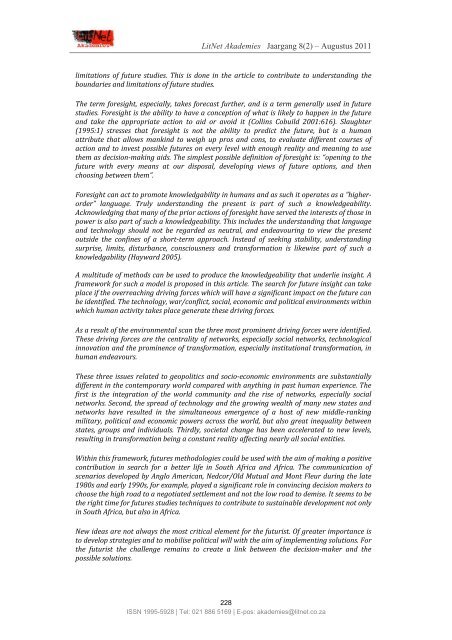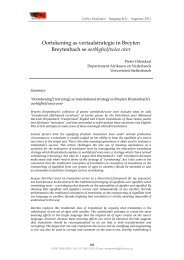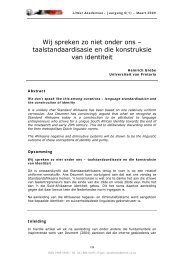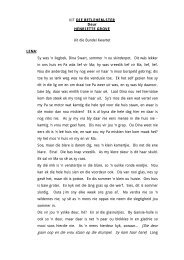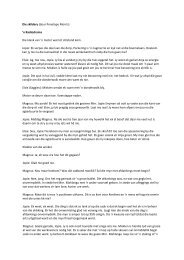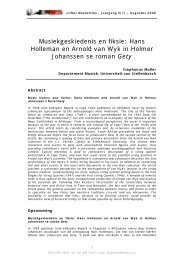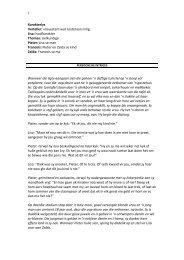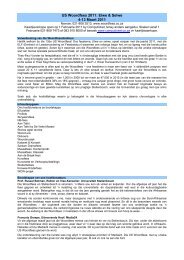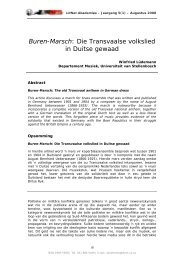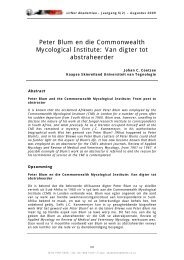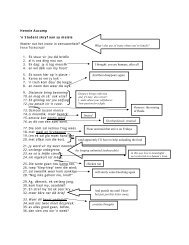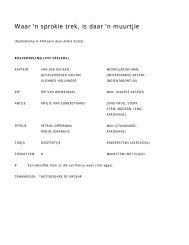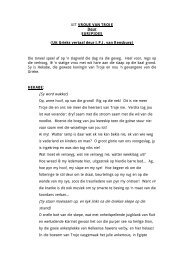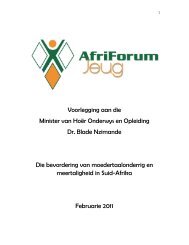Jaargang 8, nommer 2 – Augustus 2011 - LitNet
Jaargang 8, nommer 2 – Augustus 2011 - LitNet
Jaargang 8, nommer 2 – Augustus 2011 - LitNet
Create successful ePaper yourself
Turn your PDF publications into a flip-book with our unique Google optimized e-Paper software.
<strong>LitNet</strong> Akademies <strong>Jaargang</strong> 8(2) <strong>–</strong> <strong>Augustus</strong> <strong>2011</strong><br />
limitations of future studies. This is done in the article to contribute to understanding the<br />
boundaries and limitations of future studies.<br />
The term foresight, especially, takes forecast further, and is a term generally used in future<br />
studies. Foresight is the ability to have a conception of what is likely to happen in the future<br />
and take the appropriate action to aid or avoid it (Collins Cobuild 2001:616). Slaughter<br />
(1995:1) stresses that foresight is not the ability to predict the future, but is a human<br />
attribute that allows mankind to weigh up pros and cons, to evaluate different courses of<br />
action and to invest possible futures on every level with enough reality and meaning to use<br />
them as decisionmaking aids. The simplest possible definition of foresight is: “opening to the<br />
future with every means at our disposal, developing views of future options, and then<br />
choosing between them”.<br />
Foresight can act to promote knowledgability in humans and as such it operates as a ”higherorder”<br />
language. Truly understanding the present is part of such a knowledgeability.<br />
Acknowledging that many of the prior actions of foresight have served the interests of those in<br />
power is also part of such a knowledgeability. This includes the understanding that language<br />
and technology should not be regarded as neutral, and endeavouring to view the present<br />
outside the confines of a shortterm approach. Instead of seeking stability, understanding<br />
surprise, limits, disturbance, consciousness and transformation is likewise part of such a<br />
knowledgability (Hayward 2005).<br />
A multitude of methods can be used to produce the knowledgeability that underlie insight. A<br />
framework for such a model is proposed in this article. The search for future insight can take<br />
place if the overreaching driving forces which will have a significant impact on the future can<br />
be identified. The technology, war/conflict, social, economic and political environments within<br />
which human activity takes place generate these driving forces.<br />
As a result of the environmental scan the three most prominent driving forces were identified.<br />
These driving forces are the centrality of networks, especially social networks, technological<br />
innovation and the prominence of transformation, especially institutional transformation, in<br />
human endeavours.<br />
These three issues related to geopolitics and socioeconomic environments are substantially<br />
different in the contemporary world compared with anything in past human experience. The<br />
first is the integration of the world community and the rise of networks, especially social<br />
networks. Second, the spread of technology and the growing wealth of many new states and<br />
networks have resulted in the simultaneous emergence of a host of new middleranking<br />
military, political and economic powers across the world, but also great inequality between<br />
states, groups and individuals. Thirdly, societal change has been accelerated to new levels,<br />
resulting in transformation being a constant reality affecting nearly all social entities.<br />
Within this framework, futures methodologies could be used with the aim of making a positive<br />
contribution in search for a better life in South Africa and Africa. The communication of<br />
scenarios developed by Anglo American, Nedcor/Old Mutual and Mont Fleur during the late<br />
1980s and early 1990s, for example, played a significant role in convincing decision makers to<br />
choose the high road to a negotiated settlement and not the low road to demise. It seems to be<br />
the right time for futures studies techniques to contribute to sustainable development not only<br />
in South Africa, but also in Africa.<br />
New ideas are not always the most critical element for the futurist. Of greater importance is<br />
to develop strategies and to mobilise political will with the aim of implementing solutions. For<br />
the futurist the challenge remains to create a link between the decisionmaker and the<br />
possible solutions.<br />
228<br />
ISSN 1995-5928 | Tel: 021 886 5169 | E-pos: akademies@litnet.co.za


